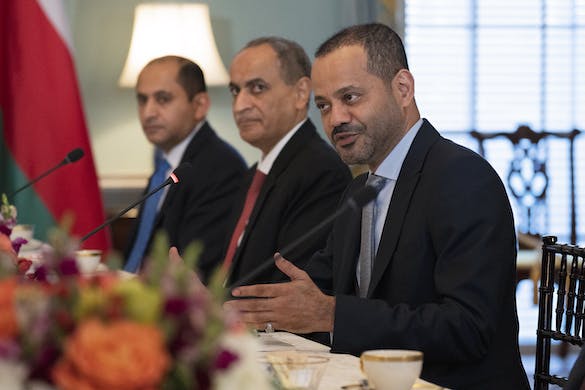Is the Iran Nuclear Deal Auditioning for ‘The Walking Dead’?
Moves by Oman’s foreign minister appear to indicate that the zombie 2015 agreement negotiated by Obama and championed by Biden may yet have life despite widespread opposition and the recent anti-hijab protests across Iran.

“The Iran deal is dead” is a Washington meme, but just how dead is the zombie? Once considered the top diplomatic aspiration of President Biden’s national security team, is the deal again showing faint signs of life?
Feature Oman’s foreign minister, Sayyid Badr Albusaidi. On Tuesday he was at Washington, where he met Secretary Blinken at the Department of State and the national security adviser, Jacob Sullivan, at the White House. Back home at Muscat yesterday, the Omani diplomat hosted his Iranian counterpart, Hossein Amir-Abdollahian.
Readouts of Mr. Albusaidi’s Washington powwows were customarily bland. The word “Iran” was studiosly absent from them — except for one line in a joint statement at the state department: Mr. Blinken thanked Oman for “its role in securing the freedom of American citizen Baquer Namazi from Iran.”
The 85-year-old Mr. Namazi, an Iranian-American, was held hostage on flimsy charges for six years before he was released last month. He landed at Muscat, where he met his family before leaving for a hospital at Abu Dhabi. Tehran has often used such “goodwill” gestures as a prelude for further negotiations.
Mr. Albusaidi’s Thursday meeting with the Iranian foreign minister yielded more clues than the ones seen in Washington; they specifically pointed to the possibility of movement in Tehran’s as-yet steadfast refusal to negotiate seriously over renewal of the Joint Comprehensive Plan of Action, as the 2015 nuclear deal is known.
The Iranian and Omani foreign ministers “exchanged their views on the latest situation of JCPOA talks on the removal of sanctions,” a regime-controlled Tehran news agency, Mehr News, reported.
The proximity of the Omani diplomat’s meetings with the American officials and with Tehran’s most senior diplomat raised some eyebrows among Iran watchers. It was at Oman, after all, where secret meetings between top aides to President Obama and their Iranian counterparts began the diplomacy that led in 2015 to the original JCPOA.
These meetings, which included Mr. Sullivan on the American side, were conducted in 2013, shortly after Mr. Obama won his second term as president, though some observers suspect they might have started even earlier. At that time Mr. Blinken was deputy national security adviser at the White House.
Mr. Sullivan, who was deputy chief of staff at the Department of State, was one of the principles in the Oman talks. Without the Oman channel, “we likely would have spent the fall of 2013 trying to figure out who to talk to and how,” Mr. Sullivan wrote in an email, as reported by columnist David Ignatius in 2016.
Although these mid-level members of the Obama administration are now senior Washington officials, conditions for Iran negotiations are very different than when Oman hosted that top secret channel, where the foundations of the nuclear deal were established.
Now an uprising led by women and girls is rocking Iran, making it even more difficult for Mr. Biden to consider reviving a deal that would enrich the Islamic Republic’s oppressors. Not that the president seems to be put off. “Don’t worry, we’re gonna free Iran,” he said earlier this month, only to have the White House walk back the statement.
The Omani minister’s current activities “raises questions on whether messages are being exchanged,” the policy director at the United Against Nuclear Iran think tank, Jason Brodsky, tells the Sun. They may discuss further releases of Americans held in Iran, he adds, but “the nuclear deal has been overtaken by events, I just can’t see it happening.”
Even if Mr. Biden decided to forget human rights and renew the JCPOA, he would still need to overcome Tehran’s refusal so far to make even the slightest compromise. The Islamic Republic’s diplomats have rebuffed all pleas from American and European counterparts to show flexibility in the talks.
Despite complaints at the UN that Iran is violating a Security Council resolution by selling missiles and drones to Russia, the American and European diplomats are yet to launch the process that would cancel the 2015 nuclear deal. By declining to “snap back” the resolution that codified the JCPOA in law, America maintains the hope, however slim, of reviving the agreement.
“I still believe that the reports of the JCPOA’s death are greatly exaggerated,” an Iran watcher at Tel Aviv university, Raz Zimmt, told the Sun.
“The midterm elections are behind us; the Iran protest is stuck; Washington’s concerns about how Bibi Netanyahu’s return to power would sway the Iranian issue; lack of a credible option B; Iran’s need to calm its public with a diplomatic and economic achievement” — all these, Mr. Zimmt says, “could lay the ground for a renewal of the deal.”
As of now, the heavy political lifting involved in relaunching diplomacy with the Iranian regime seems formidable. Mr. Biden’s Iran point man, Robert Malley, has even said that talks have been “suspended.” Yet, any diplomatic activity involving Oman is worth watching.

